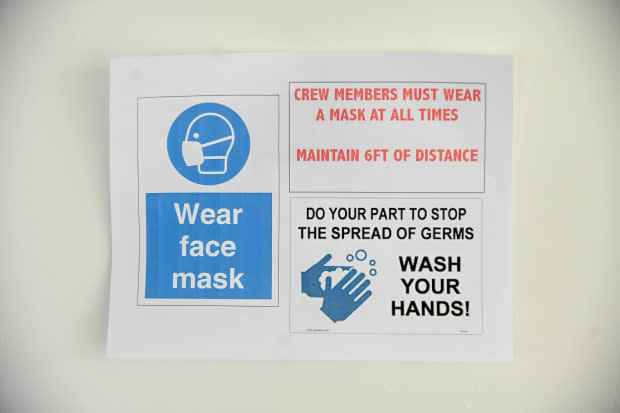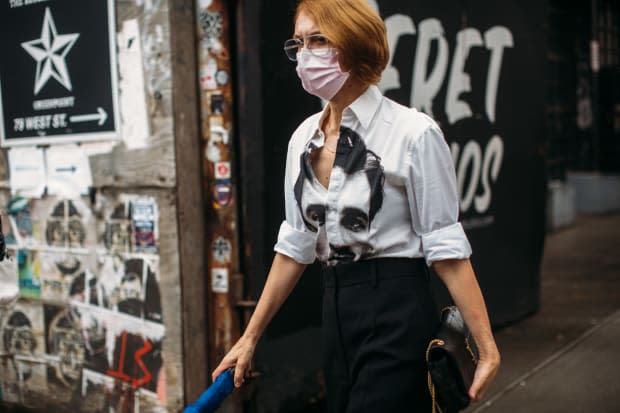How Do You Plan for New York Fashion Week in the Pandemic Age?
With the ongoing Covid-19 crisis and monkeypox outbreak, the fashion industry makes moves, cautiously, to prepare for its biggest event of the year.
For many industry insiders, New York Fashion Week has been quite underwhelming over the last few years. Many renowned American luxury brands have left the concrete streets — for its European counterparts, or for nowhere at all — and as a result, the city's fashion scene has lost some of its luster, save for the emerging designers bringing excitement back to the schedule.
So when the Council of Fashion Designers of America (CFDA) dropped the official calendar for the Spring 2023 season, it came almost as a surprise to see a slew of renowned industry names — brands like Tommy Hilfiger, Area and Puma returning after a hiatus — as well as international labels like Fendi, Marni and Cos on the lineup. With Mayor Eric Adams cosigning the jam-packed week and Vogue hosting its own outdoor runway, the September shows might just be the biggest fashion event New York has seen in years. But amidst its celebrity-filled front row seats and exclusive parties, there's the dread of falling ill during the ongoing Covid-19 pandemic, as well as growing fear around another contagious virus.
During the height of the Covid-related lockdowns in 2020 and 2021, fashion week was largely replaced with digital presentations, collection films and lookbook-only debuts (and, for some, nothing at all). Runways returned once vaccines became widely available in the United States. But as brands and fashion folks continue to adjust to the "new normal," the country is dealing with a different national public health emergency, as the monkeypox outbreak surges across the globe.

Photo: Jamie McCarthy/Getty Images
"Monkeypox is of public health concern because the illness is similar to smallpox – though not as lethal – and can be spread from infected humans, animals and materials contaminated with the virus," Dr. Manuel Flores, the executive vice president of academic affairs and provost at University of Health Sciences Antigua, tells Fashionista.
Currently, there are 13,517 confirmed monkeypox cases in the U.S., with nearly 3,000 of those in New York State alone. According to the CDC, the disease spreads most commonly through direct skin-to-skin contact, contaminated surfaces and respiratory droplets. At first, its symptoms are similar to the flu: fever, fatigue, body aches. After one-to-three days, you might develop skin sores. (Dr. Flores notes that individuals remain infectious until lesions have completely healed and scabs have fallen off, but this process can take several weeks.) There are effective treatments and vaccines available for those exposed to the monkeypox virus, but access remains limited to certain criteria.
Matthew Cancel, founder and CEO of Cancel Communications, contracted monkeypox in June. "The recovery period was about two and a half weeks for the sores to heal, and about three and a half weeks to get my full energy back — the longest-lasting symptom was fatigue, which lasted almost a month," he says. "Luckily, July was a slow month professionally, but I definitely couldn't perform to my fullest capabilities. This was concerning and stressful, since a huge part of my job is constantly being on the move and juggling multiple projects at the same time."
When it comes to health and safety guidelines for New York Fashion Week, the focus has remained primarily on Covid-19. (The last update on the CFDA and IMG's resource page mentions the Omicron variant from back in February.) For the past few seasons, the event's governing bodies encouraged a full course of Covid-19 vaccinations consistent with state and federal law for attendees, as well as mask-wearing indoors and reduced guest capacity in show venues with appropriate spacing.
"NYFW: The Shows is committed to providing a safe environment for the fashion community this September as we have done since the onset of Covid," reads a statement provided to Fashionista by IMG's Fashion Events and Properties division. "IMG will continue to follow health & safety guidelines as recommended by state and local officials." The CFDA confirmed that it was "closely [monitoring] both Covid-19 and Monkeypox cases and suggest following C.D.C. and City guidelines," adding, "The CFDA is the organizer of the official NYFW Calendar, but does not produce shows."
On Aug. 24 — a little over two weeks before New York Fashion Week officially kicked off — the CFDA published an updated health memo that addresses both Covid-19 and monkeypox. "We encourage all fashion week stakeholders to get tested regularly, monitor symptoms and stay home if exhibiting symptoms of Covid-19 and/or monkeypox," the website states. "Individuals entering a show venue should be prepared to provide full-course Covid-19 vaccinations if required by the show."
Some fashion teams are concerned about both viruses as they plan for the week-long event. "I'm waking up every day looking at my phone for health alerts — I don't think I've been this dialed into the news," says Ahniyah Gold, founder and CEO of A Gold Consulting. "It's been a lot of added work because we're moving as planned with our presentations and events, since we've already put money out. Since we work primarily with emerging designers, there's a lot more to lose in this situation, so we're making sure that we're doing what we can to support them and move accordingly."

Photo: Imaxtree
New York Fashion Week also kicks off a month of travel for many in the industry, from writers and editors to influencers and publicists. Haley Sengsavanh, a 20-year-old student and freelance writer based in Toronto, went to New York Fashion Week for the first time in February, and remembers the trip feeling overwhelming because of the Covid procedures, which are different compared to Canada. Malvika Sheth, a 23-year-old fashion and beauty content creator, remembers feeling safer at New York Fashion Week during the Omicron surge than at more recent fashion weeks in different cities because of vaccination card and temperature checks. "Knowing that there was a checkpoint for entry relieved a lot of my tensions, and I'd feel comfortable wearing a mask when I felt the need to because the crowd was quite split — some were wearing masks and some weren't," she says.
As of now, access to the monkeypox vaccine is still limited. Unlike Covid-19, though, the likelihood of someone contracting monkeypox at larger events like a fashion show or simply out-and-about is very low, especially if you're outdoors. Because monkeypox spreads through skin-to-skin contact — for instance, touching an infected person — a precaution people can take includes covering your arms and legs at a crowded event, and not sharing items like water bottles, cigarettes or straws.
"It's important to note that an emergency declaration doesn't always mean that there's an out-of-control number of cases. It can mean several things, such as rising case numbers, and is oftentimes used to allow the government to access funds and other resources to reduce the ongoing public health threat," says Dr. Brian Mangum, Associate Professor of Medicine and Epidemiologist at University of Health Sciences Antigua.
Fashion week is known for having a tight schedule and amid all these health concerns, Sheth believes it's important to prioritize your own health over making it to each and every event. "Before it was all about 'go, go, go, rest when fashion month is over,' and this time, it's much more about making sure you're staying healthy throughout," she says. "Priorities have definitely shifted. I'm trying to ensure that I can keep my immunity up while traveling. What this means is: not running to more than five, six shows a day; ensuring I get a good night's sleep each night; not skipping meals or having an irregular meal pattern. I want to make sure my body is nourished so my first line of defense — my immune system — is functioning at its optimal."
With more resources, knowledge and experience surrounding infectious diseases, people must take necessary precautions as monkeypox spreads.
"Start giving a damn," Gold says. "We have a lot more we have a lot of authority as publicists and to our clients who depend on us to obviously communicate whatever's happening and making sure that we're steering them in the right direction. I'm going to make sure that the people around us are safe."
Never miss the latest fashion industry news. Sign up for the Fashionista daily newsletter.
